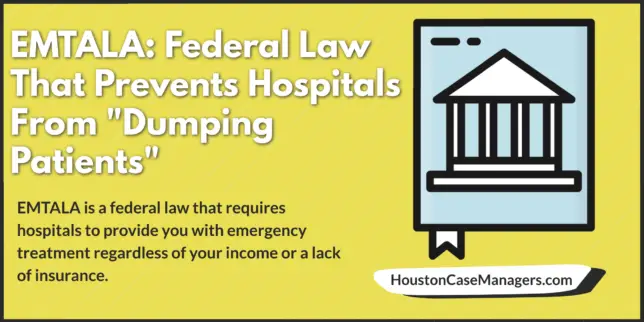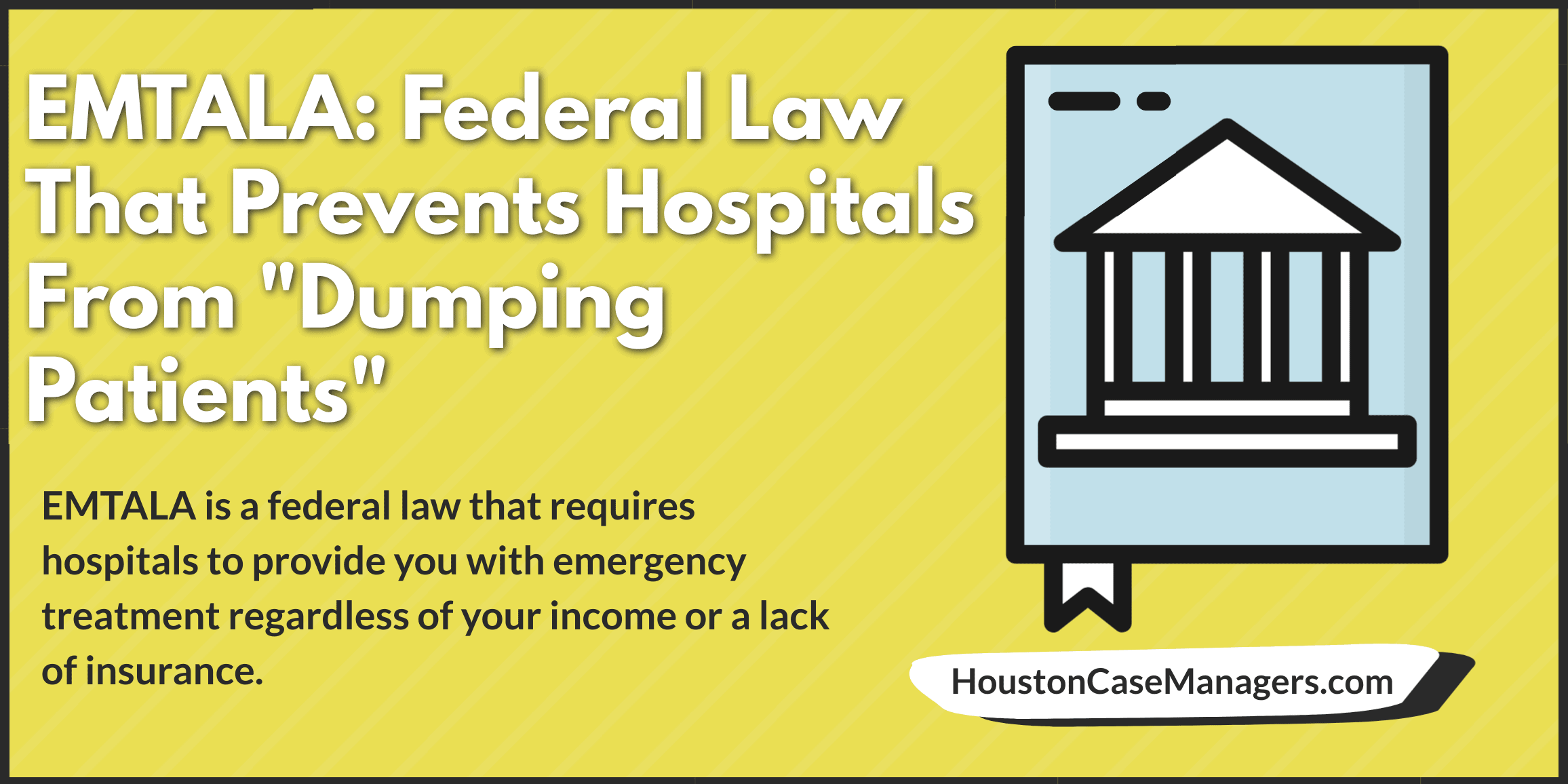EMTALA: A Federal Law That Prevents Hospitals From “Dumping Patients”
In this guide I will talk to you about a federal law that requires hospitals to provide medical treatment to you regardless of your ability to pay or lack of insurance. That law is called EMTALA which stands for Emergency Medical Treatment and Labor Act.
What is EMTALA?
Established in 1986, this federal law was created to prevent hospitals from refusing patients who had no ability to pay. Up until this point hospitals were able to deny patients who lacked insurance or the means to pay for treatment.
EMTALA Is Required At Hospitals Who Accept Medicare
EMTALA requires that most hospitals in the U.S. treat patients for emergencies regardless of their income or a lack of insurance. The only hospitals that do not have to follow this rule are those that do not accept payments from Medicare. Since most hospitals accept Medicare Assignment (or payments), most hospitals will treat you for a medical emergency regardless of your financial situation.
The 3 Hospital Responsibilities Under EMTALA
There are 3 responsibilities that hospitals have under the EMTALA law. Those are:
- Hospitals must provide patients with a medical screening examination (MSE)
- A responsibility to stabilize a patient who has a medical emergency
- If a hospital cannot treat a patient they must transfer them to a facility that can treat them.
In the following paragraphs we will talk more about those responsibilities in detail.
Medical Screening Exam (MSE)
EMTALA requires that all patients receive a medical screening examination to determine if they have a current emergency medical condition. The MSE is provided to all patients regardless of their ability to pay, a lack of insurance, citizenship, nationality, or race.
A medical emergency under the EMTALA law is described as “a condition manifesting itself by acute symptoms of sufficient severity such that the absence of immediate medical attention could reasonably be expected to result in placing and individual’s health (or unborn child) in serious jeopardy, serious impairment to bodily functions, or serious dysfunction of bodily organs”.
Stabilization
If a medical screening examination shows that a patient as a current medical emergency, the EMTALA federal law mandates that the hospital stabilized the patient prior to discharging them.
Transfers
This federal law requires that a hospital transfer a patient to another facility if it cannot provide adequate care.
Here are the EMTALA guidelines for any hospital that transfers a client to another facility:
- Treat the patient to the fullest extent that they can while in their hospital and in route to the new hospital.
- Contact the new hospital that the patient will be transferred to.
- Provide copies of medical records to the new hospital.
What Penalties Do Hospitals Face For Violating EMTALA
There are 3 main penalties that a hospital could face for failing to follow EMTALA:
- Lose reimbursement dollars from Medicare.
- Monetary fines up to $104,826 per violation for hospitals and up to $50,000 for doctors.
- Civil lawsuits from a patient or a transferring/receiving hospital
Facts About Hospitals That Violate EMTALA
AIMS Public Health did a study in 2018 that looked at the characteristics of hospitals that violated EMTALA. The study looked at EMTALA violations that resulted in monetary settlements as a result of the penalty. Here are some of the highlights of that study:
- Settlements were most common in hospitals in the South (48%) and in urban areas (74%).
- Violations which lead to settlements mostly occurred due to a hospital failing to screen and stabilize a patient.
- Violations which resulted in an EMTALA settlement declined after the implementation of the Affordable Care Act. The study believes that the increased number of people with health insurance ensured that hospitals would be paid and not have to “dump patients”. They also believe that these patients who were insured under ACA were able to receive preventative care, which helped them to avoid hospitalizations later on.
To learn more about this you can read the study called Examining EMTALA in the era of patient protection and Affordable Care Act.
Will EMTALA Pay For Your Hospital Bills?
EMTALA does guarantee treatment if you have a medical emergency, but it does not pay for the cost of services. The hospital can still bill you for the cost of treatment that you received.
If you are uninsured the treatment that you receive typically stops at that hospital. EMTALA does not require hospitals to provide outpatient medical treatment once you are discharged. They can, however, refer you to federally qualified health centers that can provide treatment for individuals who are uninsured.
Conclusion
EMTALA is a federal law that mandates that hospitals provide emergency treatment to you even if you cannot pay for your medical care. Many people wonder if a hospital will treat them if they are uninsured and the answer is yes if you are experiencing a medical medical emergency EMTALA requires a hospital to treat and stabilize you.
Although EMTALA can get you treatment in an emergency situation, it does not pay for your medical care while you are hospitalized. Because of this you are encouraged to apply for health insurance if you currently are uninsured. The best options for finding health coverage if you are uninsured are the Affordable Health Care Act, Medicaid, a local county clinic, or federally funded health clinics.
Similar Articles That May Be Of Interest To You:
Hill Burton Act: Providing Free Medical Care In Hospitals For Those Who Are Uninsured
Medicaid Retroactive Coverage: Help Paying Hospital Bills Dating Back The Past 3 Months
Nick Bryant is the author of Understanding Healthcare Is Half The Battle and a Senior Counselor with 13+ years of experience working in community health and mental health. He enjoys spending time with his family, watching WWE on Friday nights, and working toward a Google Data Analytics certification. If you have additional questions about community resources or government assistance programs, simply leave a comment below and he will follow up as soon as possible.



